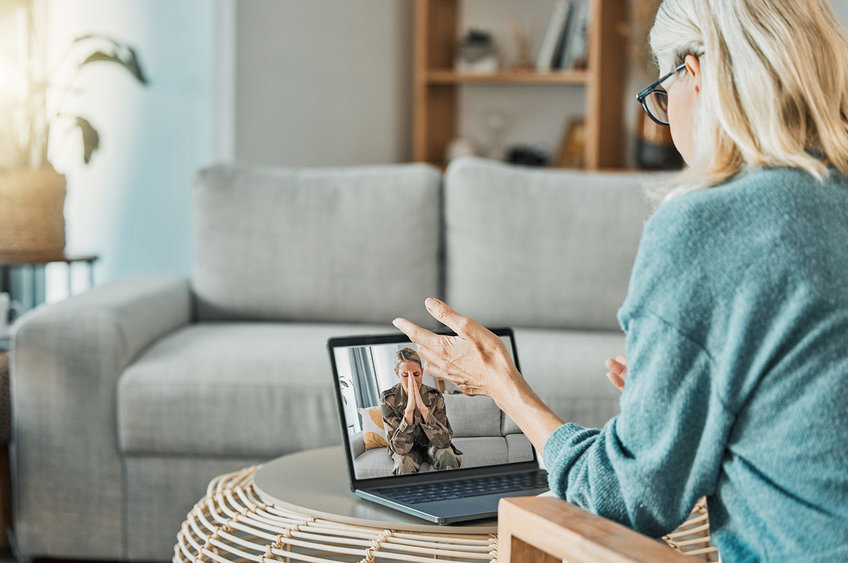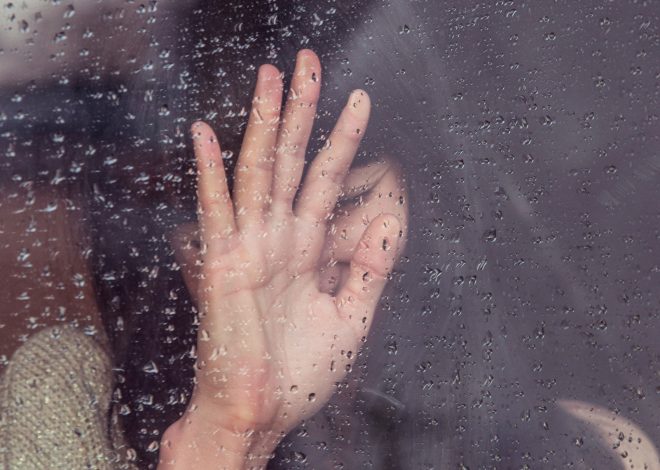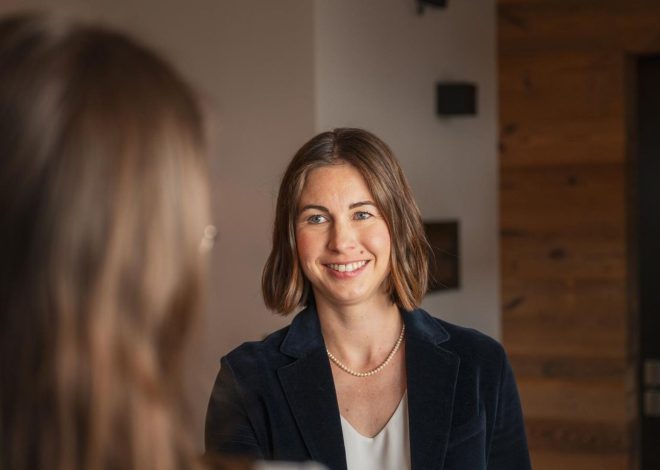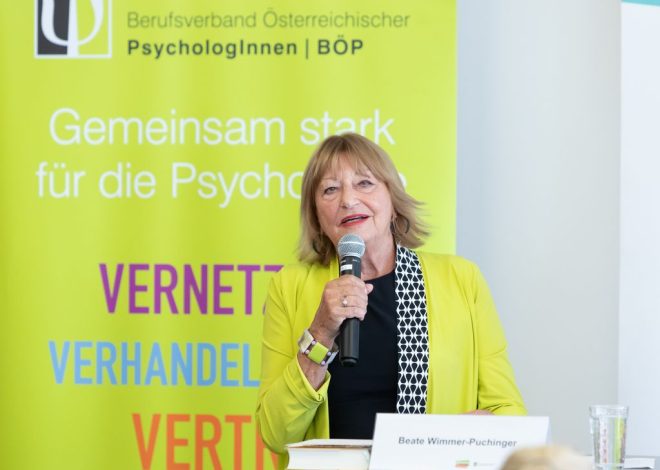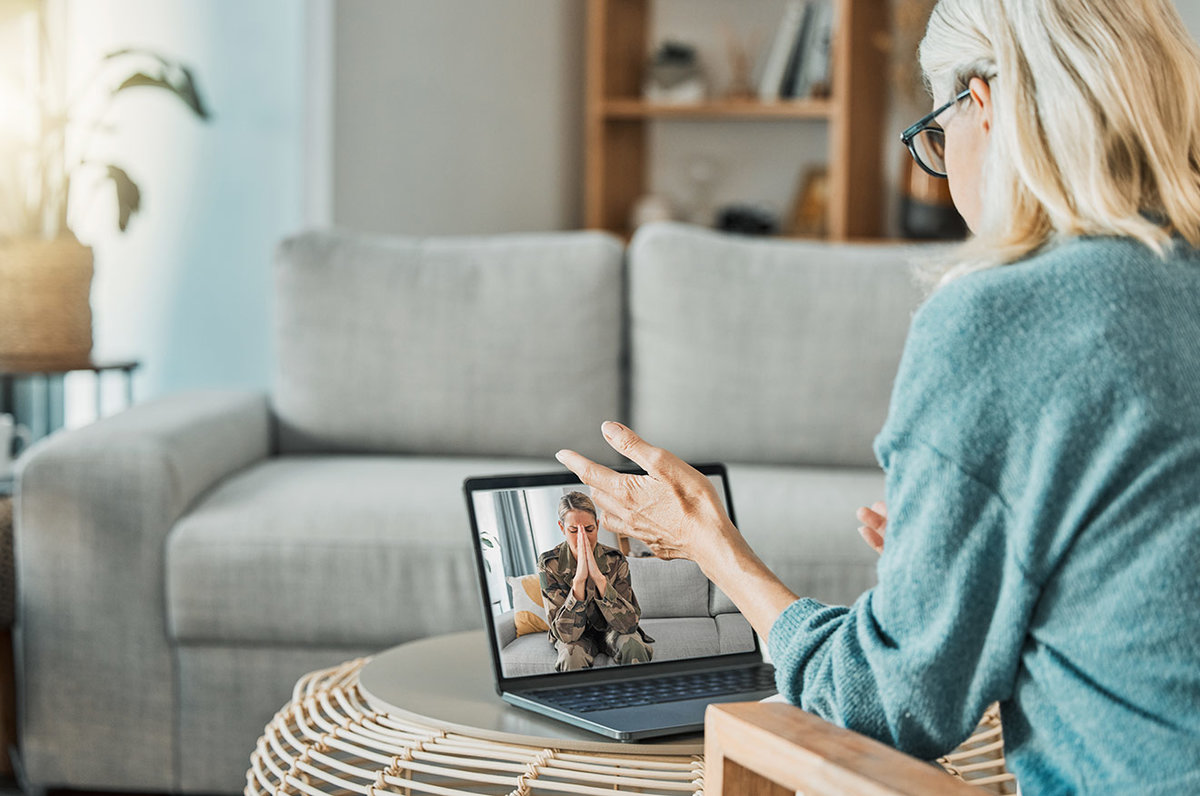
As a couple against loneliness and depression
Online intervention helps to promote social skills and reduce psychological problems
Mental health issues, loneliness and polarization are increasing rapidly, especially after the Covid19 pandemic. A new large-scale research study, the CovSocial project led by Tania Singer of the Max Planck Society, is helping people reconnect with themselves, others and society at large. Recent results show that a 10-week online mental training program with daily partner exercises can increase resilience, empathy and compassion and deepen social relationships. At the same time, short daily exercises with another person using an app – so-called dyads – reduce loneliness, depression, anxiety and a negative outlook on life. The researchers hope that this training can be used worldwide to overcome loneliness and social division.
© Coetzee / peopleimages.com / Adobe Stock
By exchanging ideas with a counterpart, the online training promotes a more positive view of the world and thus helps with depression.
© Coetzee / peopleimages.com / Adobe Stock
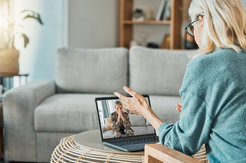
Tania Singer, psychologist, social neuroscientist and scientific director of the Social Neuroscience Lab at the Max Planck Society in Berlin, develops mental intervention programs. They are based on daily partner exercises (contemplative dyads) and are similar to mindfulness meditations, only carried out together with a partner in everyday life.
Unlike mindfulness-based meditation exercises done alone, dyads involve structured exchanges between two people, each taking turns discussing specific topics with themselves, while the other listens empathically without judging or interrupting in any way. For example, the affect dyad consists of two questions designed to make it easier to better understand and accept challenging emotions and to strengthen resilience through gratitude and caring.
More tolerance and less prejudice
In the daily dyads, participants learn social skills over a period of ten weeks. They deepen their daily practice through weekly coaching sessions led by a teacher. Together with their partners, randomly assigned each week, participants increase tolerance, reduce prejudice, overcome boundaries and foster a sense of shared humanity. With roots in ancient meditation traditions and recent advances in social neuroscience, dyadic practices have proven to be a powerful tool for cultivating social skills and promoting resilience in diverse populations.
Science is now showing the benefits of such social practices. The CovSocial Project, a large-scale mental health study led by Tania Singer and carried out with thousands of Berlin citizens during the years of the Covid19 pandemic, showed in its first phase that loneliness, stress, depression and anxiety increased with each lockdown. In a second phase, Singer and her team offered online mental training programs. The team compared the effectiveness of two ten-week online training programs: a classic mindfulness-based and a partner-based socio-emotional dyad intervention program.
Exercises are effective
Recent research shows that these daily contemplative practices, performed with another person, can actually improve participants’ mental well-being and health. They reduce depression, anxiety and difficulty regulating emotions and increase social skills such as empathy and compassion for yourself and others. Such social mental practices can also help overcome social differences, reduce loneliness and improve social relationships between people.
A recently published paper by lead author Godara showed that the online dyad program can actually reduce depression, anxiety and difficulty regulating emotions while improving resilience. Interestingly, the so-called “negative interpretation bias” – i.e. the tendency to interpret other people or situations negatively – is also reduced. Negative thoughts or perspectives can be reduced and a more positive view of the world and attitude to life can be trained.
Less depression through a more positive world view
This reduction in negativity could account for the observed increase in psychological well-being. “Both online mental interventions reduced the participants’ psychological problems. But only with dyadic social training could the increased tendency towards a more positive worldview explain the observed decrease in depression. We think that practicing gratitude daily during a dyad with a partner promotes a more positive outlook on life and thus strengthens one’s resilience and mental health,” explains Tania Singer.
In another publication from the CovSocial project, first author Hannah Matthaeus and her colleagues showed that only dyad training carried out with partners, but not classic mindfulness training, which only includes meditation carried out alone, reduces loneliness. “As we know from a previous study, daily dyad exercises can strengthen social relationships and make it easier for people to share their difficulties and vulnerabilities with others. In the current study, we were able to extend previous results and demonstrate that daily dyads conducted solely online can deepen social relationships and even reduce loneliness after just ten weeks. “Through the widespread use of such dyad-based mental training programs, the alarming trends towards social isolation, loneliness and division could be reversed,” says Singer.
Widespread use planned
Given the accumulating evidence for the effectiveness of such dyad-based mental training programs, researchers want to further develop the dyad interventions so that they can be used on a large scale – especially in social areas where there are high burnout rates and Stress is commonplace, for example in the health or education systems. Tania Singer, head of the CovSocial project concludes: “At a time when policymakers are confronted with a rising tide of poor mental health, increasing loneliness and social division, our study shows that it is possible to bring communities back together and create positive ones to promote healthy human interactions. This is what our society urgently needs. People crave a sense of belonging, community, caring and genuine social relationships. I hope that we can learn the lessons from this study and begin to expand and strengthen such mental relationship training programs for the benefit of society. That’s why we have now launched a follow-up study, the Edu:Social project, to bring these practices into the areas of education and healthcare.”
The next program, Edu:Social School, will therefore examine whether dyad programs can increase the resilience and social skills of teachers and improve team spirit among the staff and the classroom climate.

Ethel Purdy – Medical Blogger & Pharmacist
Bridging the world of wellness and science, Ethel Purdy is a professional voice in healthcare with a passion for sharing knowledge. At 36, she stands at the confluence of medical expertise and the written word, holding a pharmacy degree acquired under the rigorous education systems of Germany and Estonia.
Her pursuit of medicine was fueled by a desire to understand the intricacies of human health and to contribute to the community’s understanding of it. Transitioning seamlessly into the realm of blogging, Ethel has found a platform to demystify complex medical concepts for the everyday reader.
Ethel’s commitment to the world of medicine extends beyond her professional life into a personal commitment to health and wellness. Her hobbies reflect this dedication, often involving research on the latest medical advances, participating in wellness communities, and exploring the vast and varied dimensions of health.
Join Ethel as she distills her pharmaceutical knowledge into accessible wisdom, fostering an environment where science meets lifestyle and everyone is invited to learn. Whether you’re looking for insights into the latest health trends or trustworthy medical advice, Ethel’s blog is your gateway to the nexus of healthcare and daily living.

